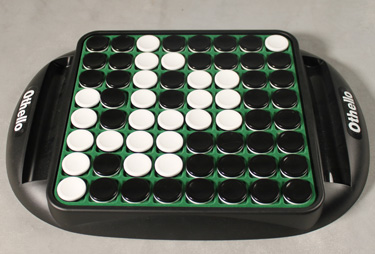

Othello
About
Attempt to have the most chips of your color on the board at the end of the game. Trap and convert your opponent's chips between two of yours to flip them over to your color.
Thoughts
Tim:
5/5 Excellent
An excellent game that stands the test of time. Simple rules but complex strategy. I would like to add more insight, but most people have played it a few times in their life. If you have not, do so. It's inexpensive, fast to learn and has as much or as little depth as you want.
Laura:
5/5
I love Othello. Keeps you on your toes and hoping to not make a mistake while you figure out the ways to block your opponent from gaining the upper hand.
History
Lewis Waterman patented the game Reversi in 1888, though he had been marketing games earlier than that date. James Mollett contested the claim that Reversi was Waterman's game, as he noted that the rules and play were very similar to his own game invention, The Game of Annexation, originally published in 1870. Mollett's Annexation game was played on a cross-shaped board, while Waterman's Reversi was played on a normal chessboard.
It is Waterman's version which is still played today, though it has not had a continuous history of popularity. During one of its down cycles, Japanese inventor Goro Hasegawa reinvented the game, with very minor differences, and marketed it in 1971 as Othello. Most players became familiar with that version of the game.
8-7-2022
